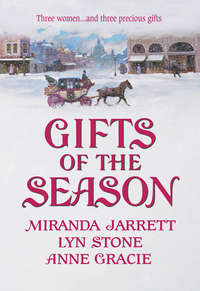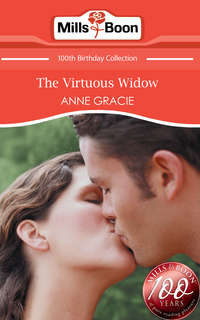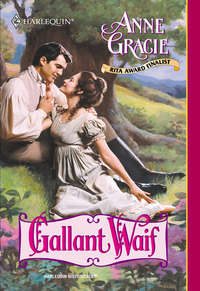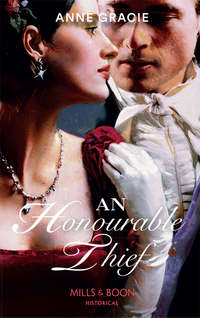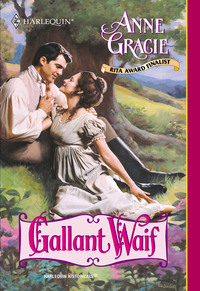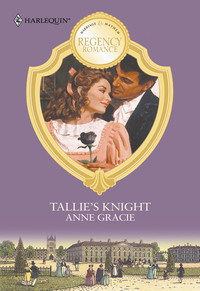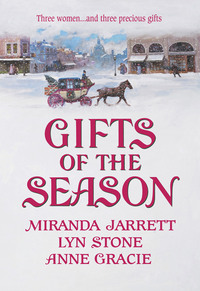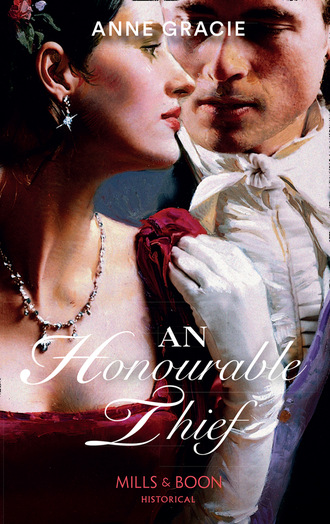
Полная версия
An Honourable Thief
Maggie sniffed. “Won’t break a promise, will you? And he knew it, drat the man!” she added under her breath. “I’ll say no more, for I was never one to waste breath in trying to change what can’t be changed.”
“Yes, and we must hurry, or I shall be late for this ball. Now, where is that shawl, the embroidered gauze one? I have a mind it will go perfectly with this gown.”
Grumbling under her breath, Maggie fetched the embroidered white-on-white gauze shawl and draped it carefully around her mistress’s shoulders. She stood back, examined Kit with a critical eye, and sighed heavily. “Aye, ’tis bonny you look, right enough, though I wish you’d wear something other than white. It does bring out that dratted brown colour in your skin.”
Kit laughed. “Oh, pooh! I am no longer brown at all—in fact, I think I look sadly pale. But there, that is the fashion, I suppose. And my gown must be white, dearest Maggie. I am supposed to be a girl just emerged from the schoolroom—naturally I must wear white.”
She ignored the maid’s snort and searchingly examined her face in the looking glass. “I do look like a young girl, do I not, Maggie? My twenty years do not show too much, do they?”
“No, Miss Kit. T’aint natural,” the maid said gloomily. “You look barely eighteen—even younger when you smile.”
“Good,” said her mistress briskly. “I must remember to smile more often then. Now hand me my cloak, if you please, or I will keep this new ‘aunt’ of mine waiting in the hallway, and that would never do.”
Kit hurried down the stairs. She found Aunt Rose patiently waiting in the hallway below.
“Ah, there you are, dear,” called Rose. “I hope that cloak you are wearing is warmer than it looks. The evening is chillier than I expected and, you know, that mausoleum of Fanny Parsons’s is as cold as a tomb, and she never heats it properly. I blame that husband of hers,” she added darkly. “The Parsons have always been shocking pinch-pennies, but he is by far the worst of them. I have had to put on three petticoats—three!—and I am sure I shall still catch a chill.” She shivered and hugged a slightly tatty fur cloak around her.
Kit could not help smiling down at the middle-aged woman as she descended the stairs. It was a little cool, but to hear her speak, one would think it about to snow.
“Aunt Rose’ was slender, almost wraithlike, with a pale, faded sort of prettiness about her—rather different to the bold good looks her father had favoured in women. And, far from being fashionable, she was generally dressed rather dowdily and, being so susceptible to drafts, always with a great many scarves and shawls trailing about her person.
And yet, despite the faded looks, despite the dowdy clothes and the vagueness, there was a definite sort of something about Rose Singleton, a certain unconscious air of ton that even the best looking and most fashionably dressed of her father’s other female friends had lacked.
Kit supposed that this was why her father had chosen to send her to Rose Singleton instead of anyone else. The surprise was that Miss Singleton had agreed to take her. In fact, she must still have harboured some warm feeling towards Kit’s father, for she had embraced Kit on her arrival in England quite as if she really were her long-lost niece.
“Ah, you are wearing pearls, my love. Very suitable,” said Rose. “I must remember to compliment your maid. So many girls in your position would be quite unable to resist the temptation to drape themselves with stones until they look exactly like a chandelier and I do so think diamonds are unsuited to a young girl. Pretty, of course, but so hard. Pearls, now, are much more suitable for an ingenue.’
“Diamonds, Aunt? There is no danger of me wearing diamonds, I assure you!” Kit could not help the choke of laughter that escaped her. Diamonds! It had been as much as Kit could manage to purchase one set of good quality fake pearls before her arrival in England. Diamonds, even paste ones, were beyond her budget.
Miss Singleton looked her over approvingly. “Yes, my dear. Very wise of you. One would not wish to appear vulgar.”
“No, Aunt Rose,” said Kit demurely. What on earth did she mean, girls in your position? A vague allusion to her imposture? If so, it would be a first. Rose Singleton could be quite determinedly vague at times, particularly when it came to avoiding subjects she did not wish to discuss. But she had been so kind and generous, Kit would not for the world distress her by referring to anything the lady wished to avoid.
She assisted the footmen to hand Rose into the coach, tuck a fur rug around her and adjust the heated bricks under her feet and then sat back, agreeably warm herself, while the coach rumbled over the cobblestones. She had learned to enjoy small pleasures while she had them.
Outside, the night was clear and bright. The coach pulled up outside the Parsonses’ town house, a grand old building, a little on the fantastical side and much embellished with Corinthian columns and odd Gothic gargoyles. It was lit, not only by gas lamps, but by flaming brands held aloft by liveried men.
Kit stepped from the coach and turned to assist Rose down. She felt a thrill of pleasure and anticipation. Tonight she would not think of anything except the ball. Tonight she would let herself be the carefree young girl everyone thought her and enjoy all the pleasures London society had to offer.
No doubt she would pay for it later, but then, that was life.
“Is this not delightful?” whispered a young girl sitting next to Kit. “I never thought there would be so many people. I have never been to a ball in London before,” she added confidingly.
Kit smiled. “Yes, it is quite new to me also.”
“Are not the ladies’ gowns beautiful?”
“Yes, very,” Kit agreed. “So many beautiful colours.”
“Kit, my dear, here is Lord Norwood, wishing to be allowed to dance with you. Give him your card, my dear,” said Rose, smiling meaningfully at Kit.
Thomas, Lord Norwood, bowed punctiliously over her hand. His fair hair was elaborately pomaded and carefully coaxed into the “Nonpareil’ style. He wore knee breeches of a nice shade of biscuit, a heavily embroidered waistcoat and a coat which fitted tightly across narrow shoulders; his shirt points were so high and so heavily starched he could barely turn his head. His neckcloth was a complicated affair involving several knots and loops. Added to this was a collection of fobs, pins and a quizzing glass. All in all, Lord Norwood appeared the very epitome of a dandy.
Kit handed her card over, hiding her reluctance. She had been hinting Lord Norwood away for several days now, but he seemed utterly impervious to her hints. She was not sure whether it was impregnable self-consequence which enabled him to overlook her indifference, or whether he had some other motive for making her the unwilling object of his attentions—a wager or some such. For unwilling she was: her plans did not allow for friendships of any sort, male or female. Her promise to her father was her paramount concern.
Lord Norwood scribbled his name on her card, bowed gracefully and handed it back, saying in world-weary accents, “Miss Singleton, my night is complete. The joy of securing my name on your dance card is all I have hoped for, or even dreamed of.”
Kit smiled sweetly. “Does this mean we do not actually need to dance, then, now that your name is safely on my card?”
He blinked in surprise, then laughed indulgently. “Such pretty wit,” he murmured. “I look forward to our dance.” He bowed again and disappeared into the throng.
“You are so lucky,” whispered the girl next to her. “He is very handsome.”
“Mmm, yes,” agreed Kit. “He is handsome.”
“And he dresses so beautifully.”
“Yes.”
“I think he likes you,” the girl whispered coyly.
“No,” said Kit thoughtfully. “I don’t think he does. I must confess I am quite at a loss to know what he sees in me at all.” She frowned as she noticed Lord Norwood disappear into one of the anterooms. It was one of the rooms reserved for those who wished to play cards, rather than dance.
“Oh, but—” began the girl.
Kit smiled quickly. “No, no. Take no notice of my foolishness,” she said. “I have a touch of the headache, that is all. I am sure Lord Norwood is everything you say he is. And I am very lucky to have been asked to dance with him. Now, I have been meaning to say, ever since you sat down, what a very pretty dress you are wearing. And such an interesting reticule. Wherever did you get it?”
Successfully distracted, the girl entered into a discussion of clothes and the various shops she and her mama had searched to obtain just the right fabric. As she extolled the delights of the Pantheon Bazaar, Kit’s attention wandered.
Lord Norwood was not the only man who had shown Kit a degree of flattering attention and her unexpected popularity disturbed her. It was not as if she was anything out of the ordinary—at least, she was, but nobody in London knew about her unconventional background, so as far as appearances went, she looked very much the part of any young lady making her come-out.
And it wasn’t as if she was beautiful or anything; there were many much prettier and more attractive girls who had been brought out that season, not to mention several diamonds of the first water. Kit had planned to move through London society with barely a ripple, attracting little notice. Anonymity was vital to the success of her plans. To this end she had tried to ensure that her personality, in public at least, appeared fairly bland and colourless. And she had certainly made no effort to attract male attention; in fact, she had tried very hard to deflect it.
And yet almost from the date of her arrival in London, she had been solicited to dance, invited to go driving, had flowers sent to her, and so on. Even the ladies had been exceptionally friendly, inviting her to soirees, musical afternoons, for walks in the park, to balls, routs and pleasure expeditions; in short, to all the many social events on the calendar of the London ton.
All this, for an unknown girl, sponsored into society by her not particularly distinguished “aunt”. Perhaps this was the reason people referred to “polite society”…?
“He’s just come in and don’t you think, Miss Singleton, that he’s the most elegant-looking man you’ve ever seen?”
Kit glanced across to where her young friend was looking. A knot of people stood in the entrance, exchanging greetings. Only one man stood out of the crowd, as far as Kit was concerned; a tall dark man in severely cut evening clothes. Elegant would certainly describe the clothes, Kit thought, but as for the man himself…
He stood out like a battle-scarred tomcat in a sea of well-fed tabbies. Tall, lean, rangy, sombre. Detached. A little wary and yet certain of his prowess. His eyes ranged over the colourful throng. Kit wished she could see the expression in them. His very stance expressed the view that he could not care the snap of his fingers for the lot of them.
He looked more like a predator than a guest.
His hair was dark, midnight dark and thick, she thought, though cropped quite brutally close; not quite the Windswept, not quite the Brutus. A style of his own, Kit thought, or perhaps he disdained to follow fashion.
She wondered who he was. He did not seem to fit in this colourful, pleasure-seeking crowd. He stood, a man apart. Indifferent.
His face was unfashionably bronzed, the bones beneath the skin sculpted fine and hard. A long aquiline nose, just slightly off centre. A long lean jaw ending in a square, unyielding chin.
Not elegant: arresting.
His mouth was firm, resolute, unsmiling. She wondered what it would take to make him smile.
A woman hastened to greet him: their hostess, Lady Fanny Parsons. Kit watched him bend over her hand. He was not a man accustomed to bowing—oh, he was graceful enough, but there was a certain hesitation, she noticed, a careless indifference.
Lady Fanny was laughing and flirting. As Kit watched, the man shrugged a pair of very broad shoulders. The hard mouth quirked in a self-deprecatory grimace. She wondered what they were discussing.
“Miss Singleton?” came the youthful voice at her elbow. “Is he not the most divinely beautiful man you have ever seen?”
Kit blinked. Elegant she could accept. Striking, certainly. Even a little intimidating. But divinely beautiful? Never.
She turned to her young friend, only to find her looking at some other, quite different man, a very pretty young fellow in a pale blue velvet coat, striped stockings and pantaloons of the palest primrose. Sir Primrose had been standing beside her man of darkness, Kit realised. She wanted to ask her young friend if she knew who the dark stranger was. Such a distinctive man would surely be well known.
“Who is—?”
But he had disappeared.
Just then, Lord Norwood came to claim his dance with Kit. And soon the music started and Kit was too busy dancing to think of anything except the delightful sensation of being a young girl at a fine London ball.
She would think about the tall dark man later.
“Hugo Devenish! How very unexpected,” gushed Lady Fanny Parsons, surging forward in a froth of satin and lace. “I was certain you would ignore my invitation as you usually do, you wicked man.”
“Ignore you? Never, Lady Fanny.” Hugo bent over the hand she offered him. “’Tis just that I am so rarely in Town.”
Lady Fanny laughed and rapped him playfully with her fan. “And I hear you have been doing battle with frightfully dangerous criminals, you hero, you! So brave, such a risk you took. I heard the latest fellow was a desperate great ruffian armed to the teeth!”
Hugo quirked an ironic brow. “Rumour does me too much honour. It was a small, unarmed Chinaman.”
“A Chinaman! Good Heavens! I hadn’t heard that! What on earth would a Chinaman be doing breaking into the Pennington house—?”
“Black pearls are highly prized in the far east, I have heard.”
“Of course, the famous Pennington Black Pearls! Poor Eliza is just devastated, you know, and her husband is furious! An heirloom. Worth an absolute king’s ransom!”
Hugo nodded. “Yes, I was unable to save them, unfortunately.”
“Oh, but think how much worse it could have been if you hadn’t disturbed the blackguard!”
Hugo shrugged, but said nothing. He had already explained to Pennington that he felt the thief had already completed his depredations when Hugo arrived.
“Oh, you are so wonderfully modest, dear Hugo. I am so glad you are here—you can protect me tonight, in case any nasty Oriental thieves break in.” Lady Fanny giggled girlishly and rapped his arm with her fan again.
Hugo bowed again, then took his leave of Lady Fanny and made a leisurely way across the crowded room to where a lady had been glaring at him since his arrival.
“What the devil has brought you to London just now, Hugo?” said Lady Norwood, leading him into a small anteroom.
Hugo observed her coolly. “I was under the impression that you had written me no fewer than eleven missives, stating in terms of utmost urgency that you required my immediate attendance.”
“Yes, but I wrote you at least six more after that telling you most expressly not to come!”
He smiled and raised a glass of champagne to his lips. “Yes, that is what decided me. I arrived this afternoon and when I presented myself in Portland Place, your butler informed me you were attending Fanny Parsons’s ball. And since Fanny had sent me a card…”
Lady Norwood stamped a foot. “Well, it is most inconvenient of you. I beg you will return to Yorkshire tomorrow morning without delay. Your presence is not needed here any longer, and to be frank, Hugo, you are very much in the way.”
Her late husband’s half-brother did not seem at all perturbed by her hostility. He shrugged. “You wrote to me that you were in grave distress.”
“Oh! Yes. Well, I was. I have been so frightfully worried about Thomas, you see.”
“About Thomas?” He regarded her with faint disbelief.
“But I have, Hugo, you have no reason to look at me like that.” She pouted winsomely in his direction. “You know what a doting mother I am, and oh! the cares of motherhood.” She sighed soulfully.
Hugo, displaying a lamentable lack of gallantry, did not respond. She peeped a glance at him through her downcast lashes. His expression was cynical.
“Dibs not in tune, eh, Amelia? Too bad. You’ll not get a penny from me, so you may as well give up the play-acting.”
Amelia abandoned her soulful mien. “You are nothing but a penny-pinching clutchfist, Hugo!”
Looking bored, Hugo strolled to the doorway and observed the dancers currently engaged in a cotillion.
His sister-in-law was not fooled by this apparent interest in his fellow guests. She glared at his back. The sight he presented did not at all meet her fastidious standards. His hair was cropped far too short and was not coaxed into a modish style, but simply brushed back from his brow. His shirtpoints were starched, but not high enough to be fashionable; his neckcloth was so plain as to be an affront to any person of taste. His coat fitted him perfectly, but it was of such a dark shade that it made him look almost as if he was in mourning, particularly in combination with his black pantaloons.
The entire effect was too sombre for words, but Amelia was forced to concede that his attire, at least, did not disgrace his family. It was the man himself who was the problem.
Those shoulders…She shuddered. More suited to a labourer than a gentleman. And his skin, which he’d carelessly allowed the sun and wind to darken to an unfashionable brown colour. She glanced at the hands holding the wineglass and sniffed. He could have worn gloves, at least! Those hands—tanned, and covered with nicks and scars—a shameful testament to a youth spent in manual labour.
She averted her gaze from her brother-in-law’s offending person and concentrated on his miserly habits.
“Not everyone enjoys a life of monkish isolation and deprivation, Hugo. We have expenses, Thomas and I. The life of a fashionable person costs a great deal. You—” She cast a disparaging glance over his plain clothing. “You would have no idea of the demands on a gentleman’s purse.”
The faint, disparaging emphasis on the word “gentleman” did not escape Hugo. But these days he was indifferent to it. His mother had been old Lord Norwood’s second wife, an heiress, with the stigma of trade attached to her. And Hugo was only the second son, after all, and with the blood of “dammed tradesmen” in his veins.
Lady Norwood continued, “In any case, as Lord Norwood, Thomas has a position to maintain, and he has every right to the fruits of his inheritance! You have no business denying—”
“Thomas’s inheritance, madam,” interrupted Hugo in a blighting tone, “was a shamefully neglected estate, a crumbling manor house, mortgaged to the hilt and falling apart with disrepair and a mountain of debts to go with them! The fact that Thomas was left anything at all was no thanks to my father and my half-brother, but to whichever far-seeing ancestor of ours established the entail which prevented them gambling away every square inch of land.”
Amelia squirmed, uncomfortably. “Yes, I know, but that is all in the past, after all. And everything has changed now, and you have returned and can—” She broke off as she glanced at him and saw the look in his eye.
She pouted and fiddled with her rings. “Well, I’m sure I am sorry about what happened to you, but it is not as if you suffered too badly—”
“You know nothing about it, madam.”
“Possibly not, but I can see you are very far from purse-pinched, after all. From all I have heard, I’m sure you could pay Thomas’s debts, and mine, and barely even notice it. We are family, after all.” She did not meet his eyes.
His lips thinned, and he inclined his head. “Indeed. Such…belated…family feeling does you honour, I am sure. But I am not going to pay Thomas’s debts. Nor yours.”
“No, you will not assist us in any way—”
“I towed this family from the River Tick, madam, if you care to recall. And I have expressed myself more than willing to teach Thomas how to manage his estate and—”
“Oh, yes—you would make of him a tradesman like yourself!” Amelia sniffed scornfully. “How Thomas would ever find himself a decent bride with the stench of trade about him I declare I don’t know!”
Hugo stared indifferently at the wall above her head.
“If you truly wished to help Thomas, you could settle a sum on him and then you need never worry about us again, but no! You will do nothing so straightforward! I think you enjoy having the power over us that you do!”
Hugo’s brows snapped together. There was an element of truth in her accusation, he realised. Not that he wanted power, but Thomas and Amelia’s constant requests for money gave him some faint feeling of being part of a family. It was a pathetic thing to realise about oneself, he thought.
“It would please me very well if I never had to see you or Thomas again.” Hugo drained his glass of wine. “I would be delighted to be able to wash my hands of the boy, but he is my only relative, after all, and I have a duty to him.”
“Well, then, why will you not—?”
“My duty is to ensure that Thomas learns not to get himself into the same spiral of gambling and debt that his forebears did!”
“How dare you sneer at my son’s forebears—they were, at least, all gentlemen born!”
“And gentlemen born live in debt, is that it? Thank God I had some common blood, in that case. No—we shall not brangle over the past.” He stood up and made for the door. “You have my last word on it, Amelia; you and Thomas must learn to live on your income, or find someone else to frank your vowels.”
“Well, and so we shall if only you will go back to Yorkshire!” hissed Amelia waspishly. “You could not have come to London at a worse time!”
Mr Devenish turned. “What do you mean?”
“Thomas and I have found a solution to all our difficulties, and if you would just take yourself away, we will bring the whole thing off.”
“What solution?”
She did not reply, but concentrated instead on examining a small, dark oil painting.
“What solution, Amelia?” he repeated in a deep, commanding voice.
Amelia tossed her head and looked mutinous. Her half-brother-in-law waited, his silent gaze boring into her.
“Oh, very well, if you must know, Thomas is taking the same solution as your father did for his difficulties. But the girl is proving very lukewarm and he will not be able to bring it off if you blunder in with your jumped-up tradesman’s blood and your ugly labourer’s hands, trumpeting your connections with us. You know they always want titles and the bluest of blood!” She sat down on her chair again in a flounce of silk.
“Who always want titles and the bluest of blood?” Hugo’s rather hard grey eyes narrowed. “You don’t mean Thomas has decided to marry an heiress?”
“Yes. Of course, he is far too young to have to make such a terrible sacrifice, but if you will persist in being so frightfully clutchfisted…”
Hugo considered her announcement. It may not be such a bad solution, he thought. With the right bride, Thomas may be induced to learn to control his ruinous habits.
As his financial advisor and uncle, Hugo could reasonably be expected to have an influence in the drawing up of the marriage settlements. He would ensure that the bride and any children she had would be protected from the results of Thomas’s extravagance. It might work, he thought. It all depended on the bride.
“So, who is this heiress?” he said mildly.
Amelia, obviously relieved by his calm acceptance of the news, sat forward excitedly on her chair. “Well, of course, nothing has been settled yet—and it probably won’t be unless you go back to Yorkshire immediately and not breathe a word to a soul!—but she has a diamond mine! She is—” Amelia’s smooth complexion glowed in triumph “—a nabob’s daughter!”


